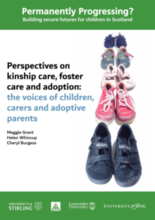Displaying 6001 - 6010 of 14390
This report presents the findings from strand one of the Permanently Progressing? study, Pathways to Permanence for children who become looked after in Scotland. This strand analysed data from the Children Looked After Statistics (CLAS) provided to the Scottish Government by all 32 local authorities on the total cohort of children who became looked after during the year 1 August 2012 - 31 July 2013 when they were aged five and under
This report has been completed as one part of the study Permanently Progressing? Building secure futures for children in Scotland which heard directly from children about their experiences.
After almost five years of detailed research and analysis, the reports of the Permanently Progressing study (phase one) were published on 20 June 2019. The study investigated decision making, permanence, progress, outcomes and belonging for a large cohort (1,836 children) of all children in Scotland who became looked after in 2012-13, when they were aged five or under.
The U.S. State Department Trafficking in Persons Report sheds light on the practices of modern slavery around the world and highlights specific steps governments can take to protect victims of human trafficking, prevent trafficking crimes, and prosecute traffickers in the United States and around the world. The report includes several references to the links between orphanages and trafficking in relation to Nepal, Nigeria, Cambodia, Haiti, Sri Lanka, Moldova, and other countries.
This article reports on a study of the relationships between child protection system contact and small area-level deprivation in New Zealand. The study found that, compared to children living in the least deprived quintile of small areas, children in the most deprived quintile had, on average, 13 times the rate of substantiation, 18 times the rate of a family group conference, and 6 times their chance of placement in foster care. Findings suggest that action is needed to address the causes of deprivation, provide services that respond to families living in poverty, and undertake further research to examine the interactions between demand and supply of services across deprivation levels.
This Data Book from the Annie E. Casey Foundation explores how the child population, and childhood experience, of the US has changed since 1990. It also presents national and state data on 16 indicators of child well-being across four domains — health, education, family and community and economic well-being.
UNICEF El Salvador busca un consultor/a nacional con conocimientos y experiencia en las materias penal, de familia y niñez, que pueda liderar la formulación de la propuesta de armonización normativa.
The ISSA Conference 2019 will be packed with the latest learnings and insights from the Early Childhood Development field, offering two days of knowledge sharing, dialogue and networking.
This study investigated the role of childhood parental deprivation in the association between quality of life (QOL) and the Epstein–Barr virus (EBV) antibody titer, a marker of cellular immune functioning, using data from 734 adults living in seven communities in rural Fujian, China.
In this blog post for Medium, Sarah Gesiriech, the U.S. Government Special Advisor on Children in Adversity, shares the U.S. Government's whole-of-government commitment to investing in the development, care, dignity, and safety of the world’s most vulnerable children as laid out in Advancing Protection and Care for Children in Adversity: A U.S. Government Strategy for International Assistance (APCCA). "The best investment a country can make to eliminate extreme poverty, boost economic growth, and promote a peaceful society is to invest in its children. When the family unit is strong, all other goals and outcomes for children are well within reach," says Gesiriech.




